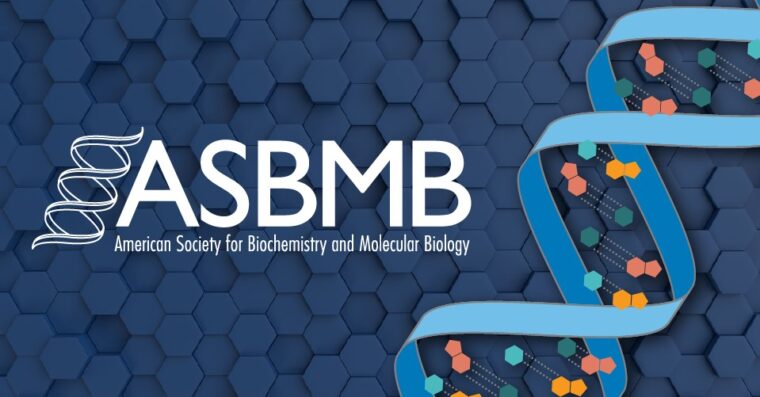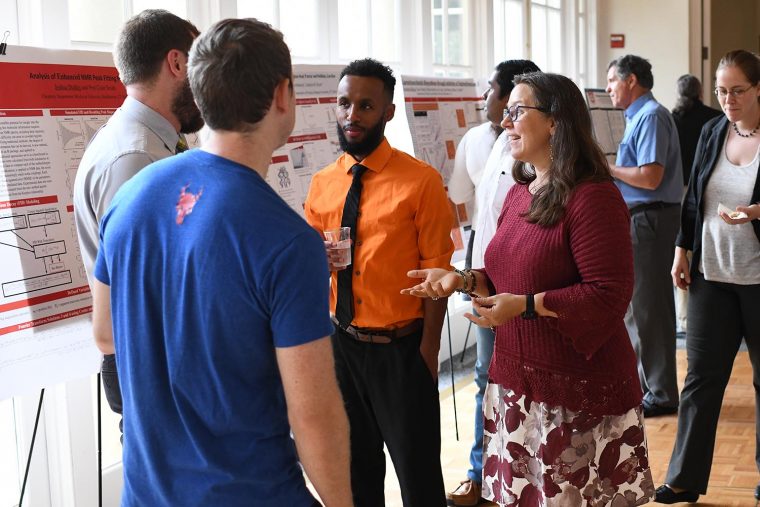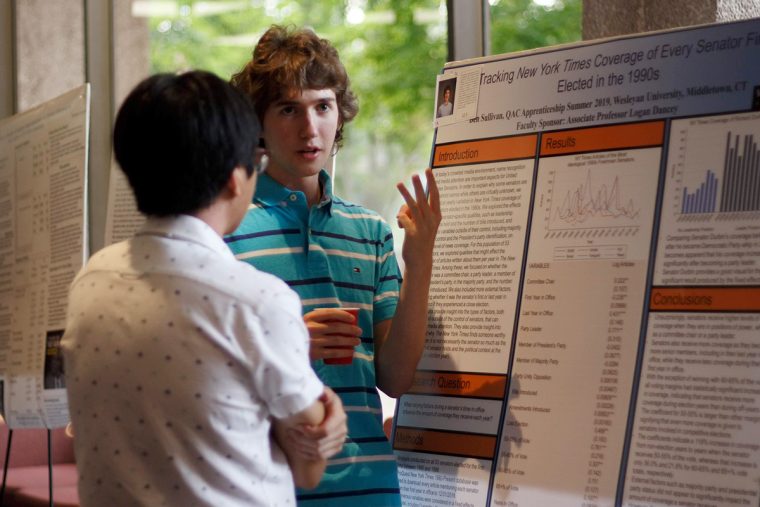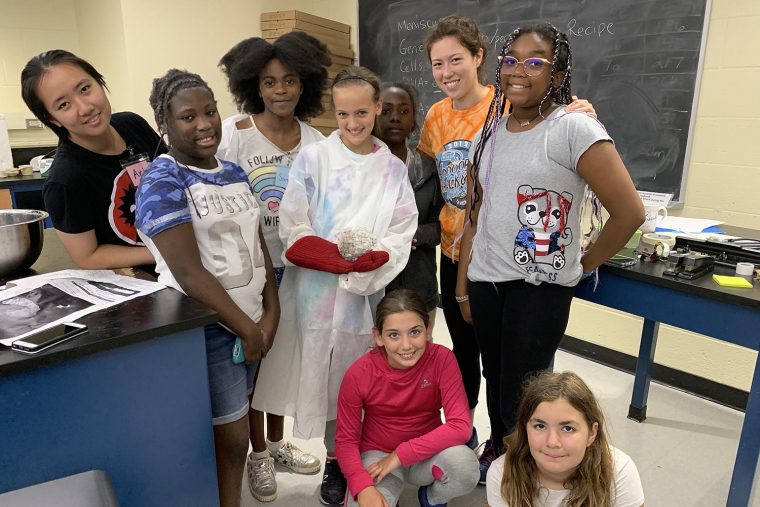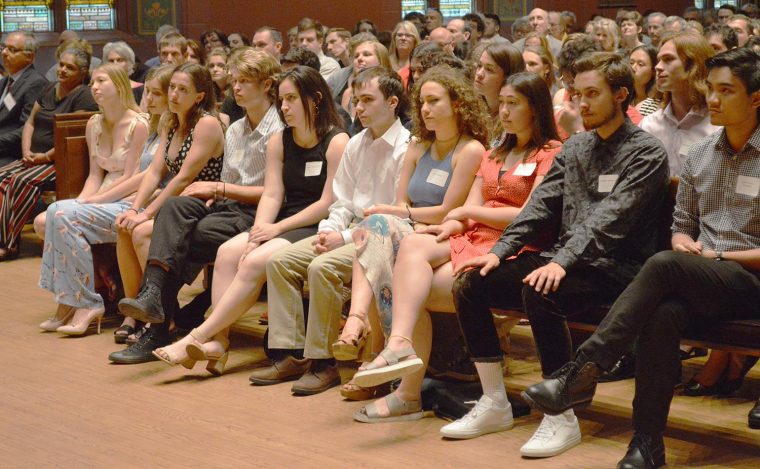With the support of a five-year, $1.1 million grant from the National Institutes of Health (NIH), Teresita Padilla-Benavides will study how transition metals—such as copper—contribute to the development of muscle. The monetary award, called an NIH Research Project Grant (NIH R01), aims to support research and development in health-related fields that bolster the mission of the NIH. “Thanks to this award, we will be able to investigate novel molecules and their association with transition metals, such as copper, and how they contribute to the development of muscle,” said Padilla-Benavides, assistant professor of molecular biology and biochemistry. “My project will investigate…
A new paper co-authored by Teresita Padilla-Benavides, assistant professor of molecular biology and biochemistry, is published in the July 2021 issue of the Federation of American Societies for Experimental Biology (FASEB) Journal. Titled "The molecular and cellular basis of copper dysregulation and its relationship with human pathologies," the paper explores the role of copper in human disease. Copper (Cu) is an essential micronutrient involved in critical metabolic reactions and biological functions. In humans, mutations or malfunctions of genes that regulate copper stability in the body may lead to numerous pathologic conditions, severe neurodegenerative conditions, or metabolic diseases. Copper also plays…
This year, five Wesleyan students were inducted into the American Society for Biochemistry and Molecular Biology (ASBMB) Honor Society. Thirty-one students nationwide were given this honor. Inducted students must be juniors or seniors with a GPA of 3.4 or higher on a 4.0 scale, belong to a student chapter of the ASBMB, and “demonstrate exceptional achievement in academics, undergraduate research and science outreach,” according to the website. The inducted students include the following: Nour-Saïda Harzallah ’21, a College of Integrative Sciences student majoring in molecular biology & biochemistry (MB&B) and physics. Harzallah, from Tunisia, works in Professor Francis Starr’s physics…
During the 65th Biophysical Society Annual Meeting held virtually Feb. 22–26, Shawn H. Lin ’22 was honored with an Undergraduate Poster Award for his work on "Elucidation of Interactions Between Integration Host Factor and a DNA Four-Way Junction." Lin, a Wesleyan Freeman Scholar, is among only six undergraduate students internationally to receive the award. Lin's advisors are Ishita Mukerji, Fisk Professor of Natural Science, professor of molecular biology and biochemistry, and Candice Etson, assistant professor of physics. Lin's poster is below (click to enlarge):
Manju Hingorani, visiting scholar in molecular biology and biochemistry, and Brandon Case PhD '19 are co-authors of a new study published in Proceedings of the National Academy of Sciences USA in July 2020. The paper, titled “Recurrent mismatch binding by MutS mobile clamps on DNA localizes repair complexes nearby," reports novel findings about the mechanism whereby MutS protein triggers initiation of DNA repair. The research at Wesleyan was supported by NIH grant R15 GM114743 awarded to Manju Hingorani. Case is currently a postdoctoral fellow at Harvard Medical School. Jennifer Tucker, associate professor of history, discusses the role of material culture and visual…
For demonstrating exceptional achievement in academics, undergraduate research, and science outreach, the American Society for Biochemistry and Molecular Biology inducted Tenzin Ngodup '20, Meera Joshi '20, and Charya Khun '20 into the ASBMB Honor Society, ΧΩΛ. ΧΩΛ recognizes exceptional undergraduate juniors and seniors pursuing degrees in the molecular life sciences at colleges or universities. To be eligible, undergraduate nominees must be members of an ASBMB student chapter, and maintain a minimum of a 3.4 GPA on a 4.0 scale. Nominations may be submitted by either a faculty ASBMB member or by the student member. Ngodup, Joshi, and Khun are among only…
Three Wesleyan faculty recently received Academic Research Enhancement Awards (R15) from the National Institutes of Health (NIH). R15 grants stimulate research at educational institutions that provide baccalaureate training for a significant number of the nation's research scientists, but that have not been major recipients of NIH support. Awards provide funding for small-scale, new, or ongoing health-related meritorious research projects, enhancing the research environment at eligible institutions and exposing students to research opportunities. Amy MacQueen, associate professor of molecular biology and biochemistry, received a $492,900 award on Aug. 7 for her research titled "How do Synaptonemal Complex Proteins Mediate the Coordinated?" MacQueen…
On Sept. 26, the Molecular Biophysics Program hosted its 20th Annual Molecular Biophysics Retreat at Wadsworth Mansion in Middletown. Several Wesleyan faculty, students, and guests attended the all-day event, which included five talks, two poster sessions, and a reception. Lila Gierasch, Distinguished Professor of Biochemistry and Molecular Biology and Chemistry at the University of Massachusetts, Amherst, delivered the keynote address, titled "Hsp70s: Allosteric Machines that Perform a Multitude of Cellular Functions." Gierasch, a leader in the field of protein folding, is a newly elected member of the National Academy of Sciences. Her work focuses particularly on folding in the cell…
The Summe Program for Research in the Sciences culminated with a research poster session in the lobby of Exley Science Center, with more than 100 students participating. The program, held May 29 to July 26, was open to frosh, sophomores and juniors currently enrolled at Wesleyan. Wesleyan science faculty members served as mentors for student research in their laboratories. In addition to the closing poster session, the students participated in weekly seminars and workshops, a symposium, and various social events. After the poster session, students displayed their posters in the hallways outside the introductory biology laboratories. (more…)
(Story by Kerisha Harris) For the sixth year in a row, the weeklong Wesleyan Girls in Science Summer Camp welcomed dozens of middle school-aged girls for a week of learning, exploration, and STEM-centered fun. From Aug. 5-9 inside Exley Science Center, the 32 campers in grades 4-6 spent the week learning about everything from how to extract DNA from a strawberry, to the parts of the brain, and even how to make (but don’t touch) an ice-cold comet. By Friday, the young scientists were excited to share all they had learned with their friends and families, and did so through a poster presentation and…
On May 25, members of the Class of 2019 were inducted into Wesleyan’s Gamma Chapter of Phi Beta Kappa Society, the oldest national scholastic honor society. The Wesleyan Gamma Chapter was organized in 1845 and is the ninth-oldest chapter in the country. To be elected, a student must first have been nominated by the department of his or her major. The student also must have demonstrated curricular breadth by having met the General Education Expectations and must have achieved a GPA of 93 and above. Phi Beta Kappa is the oldest surviving Greek letter society in America, founded in December…
Meera Joshi ’20 is the recipient of an American Society for Biochemistry and Molecular Biology (ASBMB) Undergraduate Research Award for her work on the DNA mismatch repair system. The $1,000 award will support her research titled "Exploring the Dynamics of Msh2-Msh6 Binding to Holliday Junction Through ATPase Activity. Her advisor is Ishita Mukerji, professor of molecular biology and biochemistry. Joshi's research focuses on a DNA mismatch repair protein called Msh2-Msh6 that initiates the repair of DNA mismatches after replication in eukaryotes. This is a highly conserved process from bacteria to humans and has implications for human health. "We are particularly interested in…



